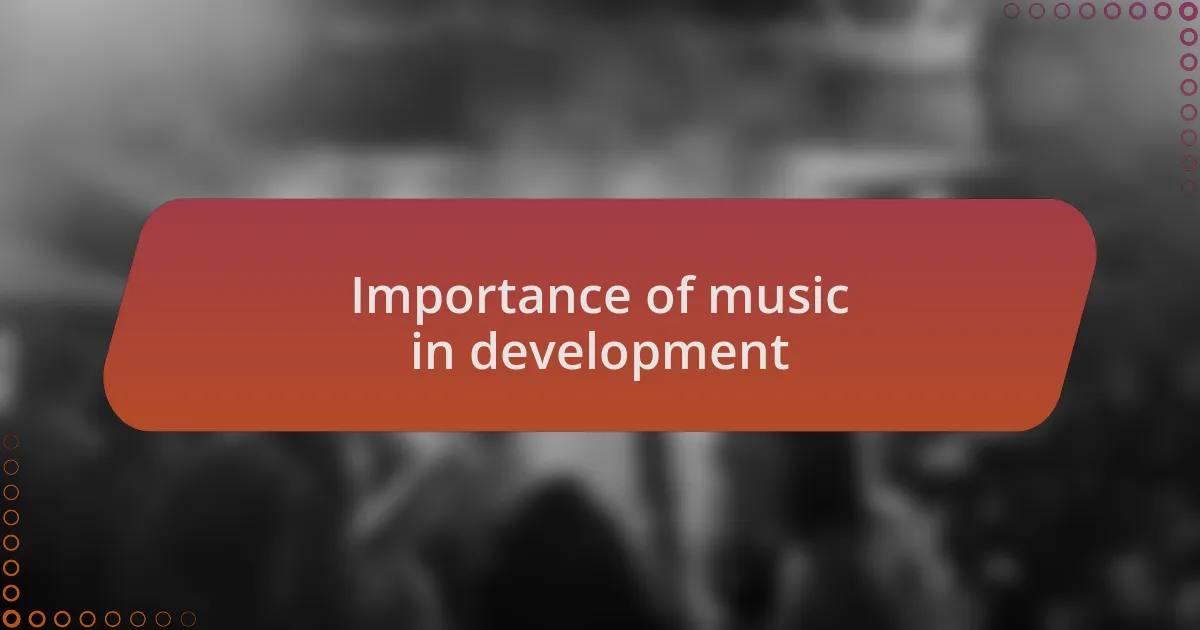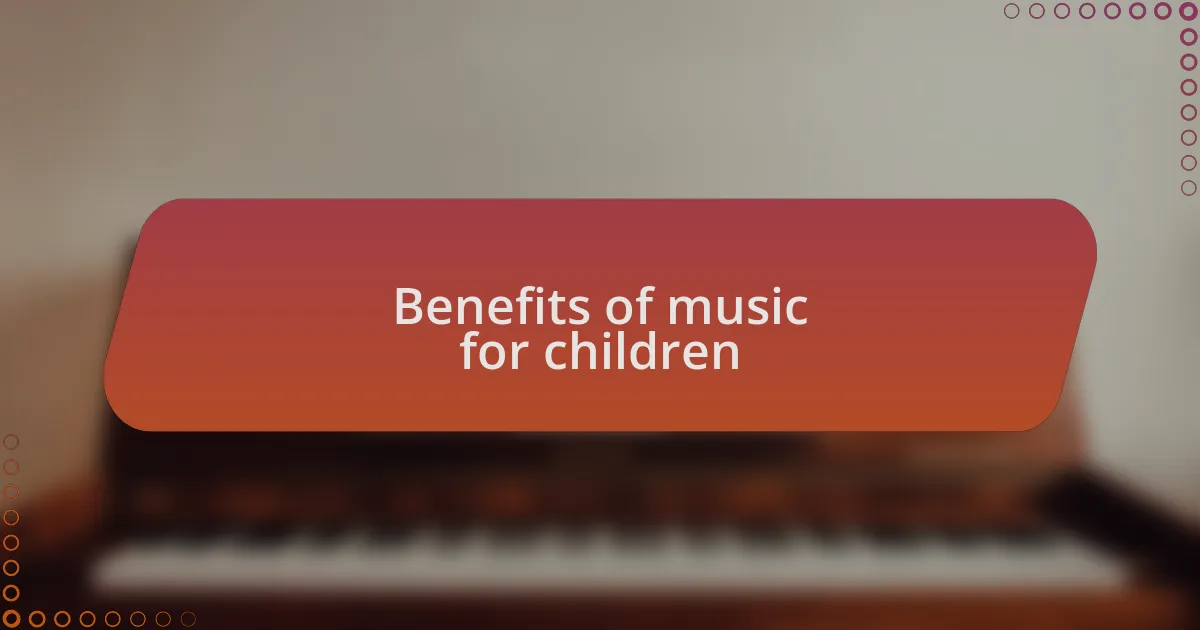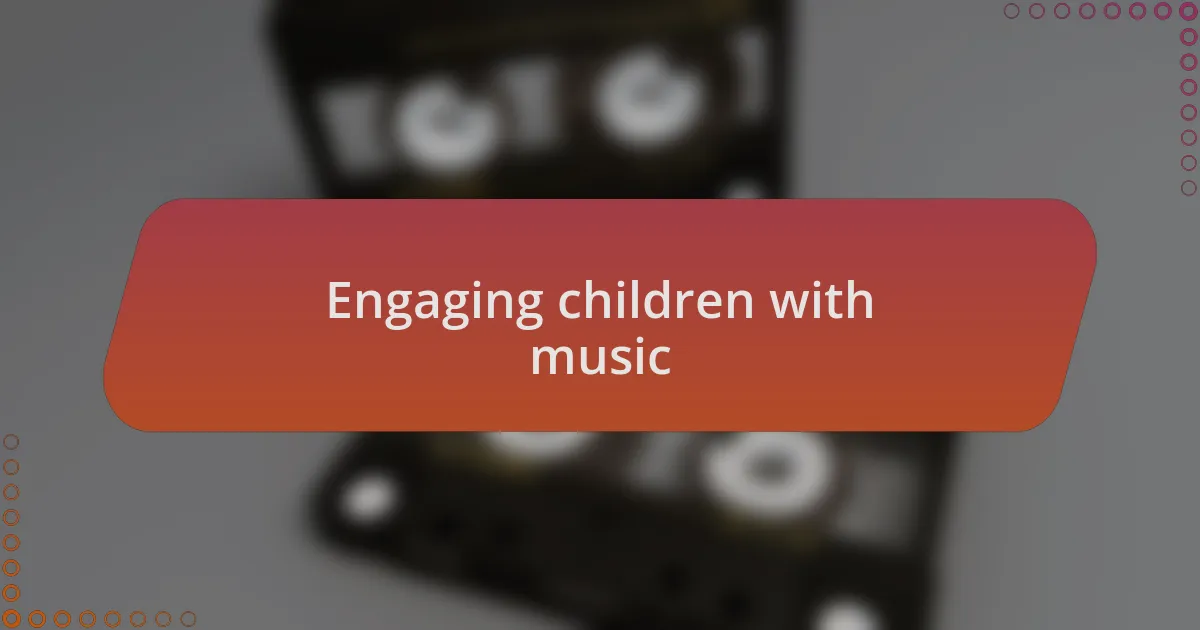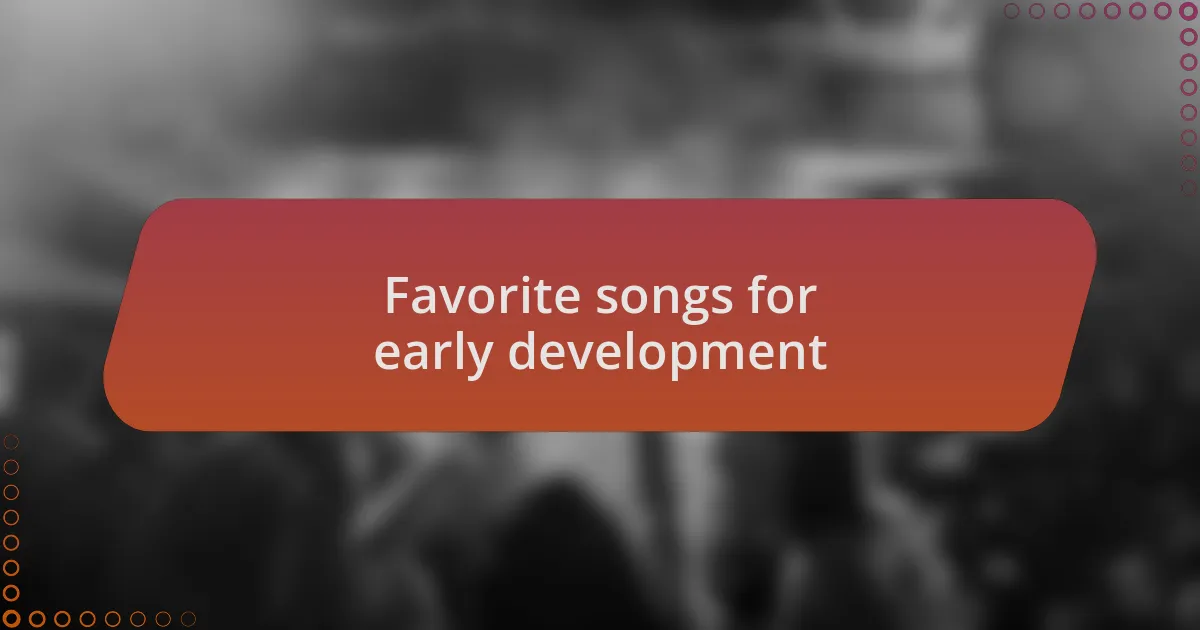Key takeaways:
- Children’s music fosters emotional connections, enhances cognitive skills, and aids in language development, contributing significantly to their overall growth.
- Engaging with music encourages creativity, social skills, and self-expression, creating memorable bonding experiences for children and caregivers.
- Simple musical activities, like singing and drumming, can transform playtime into joyful and meaningful interactions that support emotional regulation and development.
- Favorite children’s songs serve as effective tools for learning, enhancing motor skills, memory, and emotional comfort, particularly during routines like bedtime.
Understanding children’s music
When I think about children’s music, I often remember those carefree moments of singing nursery rhymes with my little ones. Those simple melodies not only entertained but also sparked a sense of joy and security in them. It’s fascinating how these early experiences with music create a strong emotional connection and foundation for their future musical exploration.
Music, in its vibrant forms, can communicate emotions that words sometimes can’t capture. I’ve seen how a lively tune can brighten a child’s mood or how a soft lullaby can soothe them to sleep. Isn’t it amazing how a simple song can evoke joy and calmness? This emotional resonance is vital in children’s development, helping them express themselves and understand their feelings.
As children engage with music, they begin to grasp concepts like rhythm and melody, which are crucial for cognitive growth. I often wonder if those early experiences might be the reason my kids developed such a keen sense of rhythm and love for storytelling. It’s a fascinating journey where each note plays a role in building their creative and analytical skills.

Importance of music in development
Music serves as a vital tool in nurturing children’s developmental milestones. I still remember the first time my child clapped along to a song, her face lighting up with the joy of making music. That moment made me realize how music not only entertains but also fosters motor skills and coordination, essential components in their growth.
Engaging with music allows children to explore their creativity and expression. I once watched my son, absorbed in his own world, create a melody using just kitchen utensils. It struck me how music encourages children to think outside the box, developing their imagination and enhancing problem-solving abilities. Isn’t it incredible how a simple activity can lead to profound skill development?
Moreover, music enhances social skills as children often engage with peers in musical activities. I vividly recall hosting a small music gathering where my kids and their friends shared songs. The laughter and collaboration they experienced not only deepened their friendships but also taught them lessons in teamwork and empathy. These interactions, sparked by music, are crucial for fostering healthy relationships as they grow.

Benefits of music for children
Exposure to music can significantly boost cognitive skills in children. When my daughter started learning songs, I noticed her ability to remember information improved. It’s fascinating to think about how rhythm and melody can help develop memory and concentration. Have you ever tried to remember something by putting it to a tune? It’s powerful how music can create those mental connections.
Music also plays a crucial role in language development. I often caught my son singing along to nursery rhymes, and I was amazed at how quickly he picked up new words and phrases. This playful interaction with sounds and words not only enriched his vocabulary but also made learning feel enjoyable rather than a chore. Isn’t it remarkable how music transforms the learning process?
Additionally, music fosters emotional awareness in young children. I recall a touching moment when my son listened to a soothing lullaby after a long day, visibly calming his racing thoughts. Music helped him articulate feelings he couldn’t express otherwise. Through melodies and lyrics, children learn to recognize and communicate their emotions, building a foundation for emotional intelligence that lasts a lifetime.

Engaging children with music
Finding ways to engage children with music can truly transform their playtime. I remember an afternoon when I set up a simple drum circle using pots and wooden spoons. The joy on my kids’ faces as they created their own beats was infectious. It was as if music unlocked their imagination, allowing them to express themselves freely and joyfully. Don’t you think simple instruments can ignite a child’s creativity?
Singing together is another fantastic way to connect through music. On long car rides, I often turn to favorite sing-along songs. I was surprised at how my children would harmonize without even realizing it, creating a magical atmosphere in our car. This shared experience gave way to laughter and bonding moments that I treasure. Could there be a better way to build memories than through the power of a song?
Interactive music activities greatly enhance engagement, too. I introduced my kids to movement games where we danced and followed rhythms, and to my delight, they learned to follow instructions while having a blast. The room was filled with giggles, and I could see that music was not just a backdrop; it became the heartbeat of our play. How can we foster more of these lively experiences in a child’s daily life?
My experiences with children’s music
Reflecting on my experiences with children’s music, I can’t help but recall a day when I introduced my toddler to a xylophone. As she struck each colorful bar, her eyes lit up with discovery. It was more than just playing notes; it was a moment of wonder, where curiosity met creativity. Have you ever witnessed such pure joy in a child’s exploration of sound?
I also remember hosting a mini-concert for my kids and their friends. They chose their favorite songs and took turns performing for one another. The excitement was palpable, and seeing them express themselves so confidently reminded me of the profound impact music has on self-esteem. It’s fascinating how a simple performance can cultivate a sense of belonging and pride, isn’t it?
In addition to playtime, I’ve found that incorporating music into daily routines helps with emotional regulation. For instance, playing calming tunes during quiet time transformed our chaotic afternoons into serene moments. This shift not only made settling down easier but also fostered a cozy environment where my children felt safe and relaxed. Isn’t it amazing how music can influence our moods and create a nurturing space for little ones?

Favorite songs for early development
There’s something magical about children’s songs that resonate deeply during early development. One of my daughter’s favorites is “The Wheels on the Bus.” I remember her mimicking the hand motions, delighting in the repetitive verses. This song not only entertains but also enhances fine motor skills and memory—who knew that a simple tune could have such a profound impact?
Another standout for us has been “If You’re Happy and You Know It.” It became a staple at family gatherings. Watching the kids clap, stomp, and sing in unison was nothing short of heartwarming. It really demonstrates how interactive music encourages social skills and creates lasting bonds among children, wouldn’t you agree?
We can’t overlook the power of lullabies either. “Twinkle, Twinkle, Little Star” has been a soothing presence in our bedtime routine. The gentle melody helps signal to my little ones that it’s time to wind down. I still remember my son’s sleepy eyes closing softly as I sang; it’s those peaceful moments that truly highlight music’s role in emotional comfort and security. How do you incorporate music into your child’s bedtime ritual?